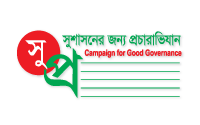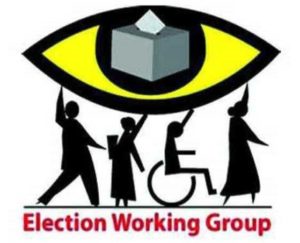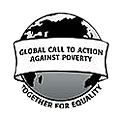
Poverty has structural causes which needs comprehensive and coordinated effort. NRDS is working with other development organizations, civil society groups, forming coalition and alliances to fight poverty and all forms of social deprivation and injustice. NRDS has a leading role in building alliances at national and regional level, which includes; The Election Working Group (EWG), Campaign for Good Governance (SUPRO), ECOTA Fair Trade Forum and National Alliance of Humanitarian Actors (NAHAB), Bangladesh at national level and Global Call to Action Against Poverty – GCAP and CIVICUS at international level.
Campaign for Good Governance (SUPRO)
Sushasoner Jonny Procharavizan – SUPRO (Campaing for Good Governance), a national network of grassroots NGOs in Bangladesh, working to establish economic, social and cultural rights of poor and marginalized people at all spheres of society and state through facilitating right based activism at grassroots, national and global level. SUPRO critically analyses global and national level rules, regulations and policies to facilitate grassroots activism to make these work for the poor and marginalized people.
As an institutional strategy, SUPRO works with the grassroots NGOs and CSOs to unite their voices aiming to sensitise and influence the national and global leaders and policy makers with a view to bringing about desired policy changes beneficial for the people in general and poor and marginalized in particular. For bringing about pro-poor policy and associated institutional reform through establishing macro-micro linkage; SUPRO engages itself in campaign, mobilization and advocacy on different issues such as good governance; economic justice; PRSP process; budget tracking and analysis; trade justice; climate change; IFI policies and debt cancellation.
Chief Coordinator of NRDS Mr. Abdul Awal is the founder trustee and also the founder Chairperson of SUPRO.
For details you may visit: www.supro.org
Election Working Group
The Election Working Group (EWG) is a non-partisan, 32-member network of civil society organizations. Established in 2006, EWG members share a common commitment to free and fair elections and good governance in Bangladesh. The guiding objectives of the EWG are to support free and fair elections through pre-election, election day, and post-election observation , to conduct voter and civic education in key thematic areas that encourage the full participation of all segments of society in the electoral process and to promote electoral reform through public dialogue and advocacy.
The National Secretariat of the EWG, headed by a Director, coordinates the day-to-day activities of the EWG on behalf of its members, with oversight from an elected Executive Committee. Through its wide and varied membership, the EWG has outreach down to the village level throughout Bangladesh, making it an effective network through which to deliver voter information materials and to recruit both stationary and mobile election observers. A national network, but international in reach, EWG members have participated in election observation missions in various countries, including Thailand and the Philippines.
Chief Coordinator of NRDS Mr. Abdul Awal is the present Chairperson of national committee of The Election Working Group (EWG).
ECOTA Fare Trade Forum
ECOTA Fair Trade Forum (EFTF) started in 1990, is a networking and coordinating body of Small and Medium Fair Trade Enterprises of Bangladesh. The organization is intended on well being of the artisan and poverty alleviation through Fair Trade promotion by addressing the current trade practices in critique of Incorporation and everyday operating policies. 
It works for the capacity building of the Artisans through the member organizations, Promote social policies in the context of the fair trade movement, Facilitate marketing and trade initiatives of fair trade handicraft at home and abroad with special concern on ICT, Advocate and campaign with the national, regional and international bodies for the issues related to handicrafts sectoral development and Works for the promotion & realization of Fair Trade principles for the betterment of the artisans especially women, indigenous community and physically challenged people. For details you may visit: eftfbd.org
National Alliance of Humanitarian Actors (NAHAB), Bangladesh
NAHAB is an alliance of voluntary, non-government, non-profitable, and non-political organizations that will advocate and facilitate a balanced, faster and needful humanitarian actions in Bangladesh.
This platform will act as a centre of excellence to create a culture of cross learning through identifying best innovative knowledge and skills of disaster management across Bangladesh, as well as leveraging opportunities for effective and timely humanitarian response and preparedness.
For details you may visit: http://www.nahab.net
The Global Call to Action Against Poverty (GCAP)
The Global Call to Action Against Poverty (GCAP) is a southern-led movement that challenges the structures and institutions that perpetuate poverty and inequality. GCAP supports people in their struggles for justice and brings individuals and organisations together to challenge the institutions and processes that perpetuate poverty and inequalities. Together, we defend and promote human rights, gender justice, social justice, climate justice and the security needed for the dignity and peace of all. National Coalitions and Constituency Groups, which are the base for action, collaborate on regional and global campaigns.Our constituents include women, youth and socially excluded movements, NGO platforms, community and faith groups, international NGOs and others who call for action from world leaders to meet their promises to end poverty and inequality.
Chief Coordinator of NRDS Mr. Abdul Awal is the member of Asia facilitation group of GCAP and also the former global council member of GCAP.
For details you may visit: www.whiteband.org
CIVICUS
World Alliance for Citizen Participation is an international alliance of members and partners which constitutes an influential network of organisations at the local, national, regional and international levels, and spans the spectrum of civil society. CIVICUS includes the following in its definition of civil society: civil society networks and organisations; trade unions; faith-based networks; professional associations; NGO capacity development organisations; philanthropic foundations and other funding bodies.
CIVICUS has worked for nearly  two decades to strengthen citizen action and civil society throughout the world, especially in areas where participatory democracy and citizens’ freedom of association are threatened. CIVICUS has a vision of a global community of active, engaged citizens committed to the creation of a more just and equitable world. This is based on the belief that the health of societies exists in direct proportion to the degree of balance between the state, the private sector and civil society.
two decades to strengthen citizen action and civil society throughout the world, especially in areas where participatory democracy and citizens’ freedom of association are threatened. CIVICUS has a vision of a global community of active, engaged citizens committed to the creation of a more just and equitable world. This is based on the belief that the health of societies exists in direct proportion to the degree of balance between the state, the private sector and civil society.
CIVICUS provides a focal point for knowledge-sharing, common interest representation, global institution-building and engagement among these disparate sectors. It acts as an advocate for citizen participation as an essential component of governance and democracy worldwide. CIVICUS seeks to amplify the voices and opinions of ordinary people and it gives expression to the enormous creative energy of the burgeoning sector of civil society. For details you may visit: www.civicus.org
